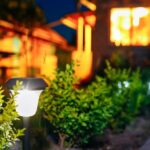How To Clean Cloudy Solar Light Panels? Must-Know Techniques
Use a clean, wet cloth to gently wipe down hazy How to clean cloudy solar light panels. Over time ability to collect sunlight and turn it into electricity can degrade due to cloudiness.
This buildup of dirt, dust, and debris might have an impact on your solar lights’ overall performance. You can guarantee the panels’ best performance and maximize their ability to convert energy by routinely cleaning them. Start by turning off the lights and unplugging them from any power sources if the solar light panels are overcast.
Then, gently wipe away any debris, dust, or grime from the panel’s surface using a clean, moist cloth. Be careful not to use any harsh chemicals or abrasives that could harm the panels. Your solar lights’ efficiency and long-term performance may be maintained with regular maintenance.
Learning About how to clean cloudy solar light panels?
For solar light panels to function well, proper maintenance is essential. For clean, bright lighting, regularly remove dust and grime accumulations.
How to Make Solar Lights Last Longer
Dirt and dust can have a significant negative impact on clean cloudy solar light panels’ performance and effectiveness. The accumulation of these particles can obstruct sunlight absorption and lessen electricity production. In this part, we will examine how dirt and dust affect solar panel performance, emphasizing their detrimental effects on their effectiveness.
Dust’s role in lowering solar panel efficiency
1. Dust buildup: Especially in dry and dusty areas, solar light panels may accumulate layers of dust over time. As a result of this accumulation, the photovoltaic cells’ capacity to convert solar energy into electricity decreases because less sunlight is reaching them.
2. Restricting sunlight’s penetration: Dust and dirt particles collect on the surface of solar panels, forming a barrier that prevents sunlight from penetrating. This barrier allows the solar light panels to utilize less energy.
3. Shading effect: Thick dust accumulations can shade solar panels, preventing some areas from receiving enough sunlight. This partial shadowing lowers the overall efficiency of the entire solar panel system.
4. Increasing temperature: Solar panels’ working temperatures might also rise as a result of dust and dirt accumulation. The performance and lifespan of the panels may be impacted, and they may become less effective at converting solar energy into useful power as a result of this temperature increase.
5. Micro-scratches on solar panels’ surfaces due to abrasive effects: Some forms of dust and dirt particles have the potential to be abrasive. These blemishes may affect the panels’ optical qualities, further lowering their effectiveness.
It’s essential to comprehend how dust and grime accumulation affect solar panels in order to keep them operating at peak efficiency. We shall examine effective techniques for clearing hazy How to clean cloudy solar light panels and regaining their effectiveness and energy output in the part after this one.
How Can I Tell If My Solar Light Panels Are Cloudy?

A decrease in brightness and performance can indicate whether clouds are affecting solar light panels. Make sure they are free of dirt and debris by gently wiping the surface with a soft cloth and a light detergent. For solar panels to operate as efficiently as possible, regular cleaning and maintenance are crucial.
Solar panels that are cloudy can be seen visually
- The solar panels’ outer surfaces appear cloudy or dusty, which prevents sunlight from penetrating them.
- The panels’ surface is covered in what appears to be a layer of dust or debris.
- In place of being transparent, the panels could have a frosted or milky look.
- On the solar panels, you could see fading or black areas.
- The panels may have physical damage or cracks if they have been exposed to harsh weather.
Checking for reduced power output:
Use a solar output meter to measure the amount of power the panels are generating. Cloudy panels may be the cause of a considerable drop in power production compared to prior observations.
Keep an eye on the performance of your solar lights and take note of any noticeable brightness loss or reduction in operating time.
Keep an eye on your energy costs. A sudden spike in the amount of electricity drawn from the grid could indicate that your solar panels are not operating at their best.
Keep in mind that cloudiness has a direct impact on your solar panels’ performance and overall energy production; therefore, you must regularly check for it. You can make sure that your solar lights are operating as efficiently as possible by taking care of this problem.
Getting Ready For Cleaning
Cloudy skies can have an impact on your solar lights’ efficiency. Use a soft cloth and soapy water to gently wipe the panels, then rinse with clear water to thoroughly clean them. Routine maintenance ensures the best performance.
You need to acquire the essential equipment and supplies, take safety precautions, and clean your foggy How to clean cloudy solar light panels To get started, take these actions:
Getting the Required Equipment and Materials
- A soft-bristled brush: Use this to clean the solar light panels’ surface of any loose dirt or debris.
- Moderate soap or detergent solution: To make a moderate cleaning solution, combine a few drops of mild soap or detergent with water.
- Microfiber sponges or cloths can be used to clean the panels without damaging them because they are gentle and non-abrasive.
- Clean water bucket: To rinse the cleaning agent and dirt from the panels, fill a bucket with clean water.
- Ladder or step stool: You might need a ladder or step stool to safely access your solar light panels if they are situated in difficult-to-reach locations.
- Rubber gloves and safety glasses will safeguard your hands and eyes as you clean the panels from any potential risks.
Putting in place safety measures:
- Turn off the solar panels for lighting. To prevent any electrical mishaps, turn off the solar light panels before you begin the cleaning process.
- Examine the weather: Pick a day that is dry, sunny, and free from rain or clouds so that you can clean the panels effectively.
- Put on appropriate footwear: To avoid slips and falls when using stepstools or ladders, use non-slip footwear.
- Secure the ladder or step stool: Before ascending, make sure the ladder or step stool is secure and set up on a level area.
- Refrain from using strong chemicals; instead, use a gentle soap or detergent solution to protect the panels.
- Be gentle: When cleaning the panels, use a soft brush and cloth to prevent scratching or any damage to the surface.
To ensure safe and successful cleaning of your foggy solar light panels, make the following preparations:
Dry Cleaning Techniques
Learn how to use quick and easy dry-cleaning techniques to thoroughly clean foggy solar light panels. Use these simple methods to keep your solar lights blazing brightly.
Over time, solar light panels may develop cloudiness, which decreases their effectiveness and longevity. Thankfully, there are efficient dry-cleaning techniques that bring back their clarity. Continue reading to discover two straightforward yet useful methods for cleaning your foggy solar light panels.
Taking Out Loose Debris With A Soft Brush:
- Check your solar light panels to see if there are any loose objects, including leaves, dust, or dirt.
- To get rid of the loose debris, gently brush the surface of the panels with a soft-bristled brush.
- Watch out not to put too much pressure on the panels to protect them.
- Make sure the brush is thoroughly clean and devoid of any abrasive debris that could scratch the panels.
- Focus on areas with obvious accumulation as you gradually sweep the brush over the panels’ whole surface area.
- Carry out this procedure repeatedly to preserve the panel’s functionality and prevent debris buildup.
Cleaning with Compressed Air: An Effective Method
- Check to see if there is any obstinate or difficult-to-reach dirt or debris on your solar light panels.
- Compressed air can be used for sensitive cleaning or electronics.
- Hold the can upright and point the nozzle at the panels’ troubled regions.
- Gently press the nozzle to release quick bursts of air that are directed at the debris.
- The force of the compressed air should displace and blow away the dirt particles.
- For safe and efficient use, make sure to adhere to the manufacturer’s recommendations on the can.
- Examine the panels to make sure all dirt and debris have been thoroughly removed after cleaning them.
These straightforward, effective dry-cleaning techniques can greatly raise the efficiency of your solar light panels. You can maintain your panels’ clarity and increase their ability to produce electricity by cleaning them frequently. Remember to handle the panels with care and stay away from abrasive or strong chemicals that could harm them.
By using these methods, you’ll be able to get the most out of your solar lights and maintain their brightness for many years to come.
Dry Cleaning Techniques
Cloudy solar light panels can be effectively cleaned by using wet techniques to remove dirt and grime. You can bring back their clarity and guarantee peak performance by giving them a gentle wash with water and a moderate detergent.
Regular cleaning is necessary to maintain your solar light panels in top condition and improve their effectiveness. Cleaning the panels with water is the most efficient way to get rid of dirt, grime, and cloudiness. Here are various methods to use:
Making A Cleaning Solution Correctly:
- Combine mild dish soap and warm water in a spray bottle or bucket.
- Mix 10 parts water with 1 part dish soap.
- Gently stir the mixture to dissolve the soap.
Application Methods For The Solution To The Panels:
- Directly apply the cleaning agent to the solar light panels’ surface.
- Gently wipe the panels down with a gentle sponge or cloth.
- To guarantee complete coverage, begin at the top and move downward.
- Use a little touch to prevent scratching the panels.
- To get rid of any soap residue, rinse the panels with clean water.
- Use a clean, lint-free cloth to dry the panels.
You can thoroughly clean your foggy solar light panels and preserve their best efficiency by using the wet cleaning techniques described below. Your solar lights will continue to brighten your outdoor space effectively if you maintain them regularly.
Cleaning Methods For Various Panel Types
Over time, solar light panels can develop cloudiness, which lowers their effectiveness and reduces the brightness of your outdoor lighting. Cleaning your solar panels on a regular basis using the right methods can ensure their optimal efficiency and longevity.
Whether your solar light panels are composed of non-glass materials or have a glass surface, the technique you employ to clean them may vary. We’ll look at cleaning methods for various panel types in this part to help you keep your solar lights functioning at their best.
Cleaning Advice For Glass Panels:
For glass panels to function at their best, cleanliness and transparency are essential. You may effectively clean and maintain the glass surfaces of your How to Clean Cloudy Solar Light Panels by following the advice in the following list:
1. Prepare a sudsy solution using water and light dish soap. Prepare a sudsy solution using water and mild dish soap. To remove dirt and grime, apply this solution to the glass surface and clean it softly with a cloth or sponge.
2. Use fresh water to rinse: Clean water should be used to completely rinse the glass surface after scrubbing. This will guarantee a finish without streaks and help remove any remaining soap residue.
3. Dry with a lint-free cloth: After rinsing the glass panel, dry the surface with a lint-free cloth or towel. By doing this, water spots or streaks won’t form, leaving the glass clear and transparent.
4. Steer clear of abrasive cleansers and products: Harsh chemicals and abrasive cleaning tools can scratch the glass surfaces of your solar panels. To preserve the integrity of the glass, use gentle cleaning agents and soft materials.
Cleaning Methods For Surfaces Other Than Glass Panels:
Solar light panels don’t all have glass surfaces. Some might be constructed from materials other than glass, including silicone or plastic. Here are some cleaning methods designed especially for surfaces other than glass panel surfaces:
- Use a mild cleaner: For surfaces other than glass, go with a mild cleaner made for the particular material of your solar panels. Avoid using harsh chemicals that could harm your skin.
- Soft bristle brush or cloth: Gently scrub the non-glass surface with a soft bristle brush or non-abrasive fabric. Without leaving any scratches, this will assist in cleaning up dirt and debris.
- Rinse with water: To get rid of any cleaner residue, rinse the non-glass surface with water after cleaning. Making sure the finish is residue-free is crucial.
- Thoroughly dry the surface: After rinsing the surface, completely dry it to avoid water stains and streaks. For optimal results, use a lint-free cloth or towel.
You can keep your solar light panels in top condition, maintaining maximum efficiency and brightness for your outdoor lights, by adhering to these cleaning procedures for various panel types. Your solar panels’ effectiveness and longevity will be maintained through routine cleaning, allowing you to reap their benefits for many years to come.
Cleaning Solar Panel Mounting Structures and Frames

For solar panel frames and mounting systems to remain in top condition, regular cleaning is necessary. You may increase the effectiveness and lifespan of overcast solar light panels by cleaning out dirt, dust, and grime.
Your solar lighting system must include mounting and frame components for solar panels. They give the panels stability and support, ensuring that they can efficiently capture sunlight for energy conversion. To improve the efficiency and durability of your solar lights, it is essential to keep these components clean and well-maintained.
This section will cover the various cleaning techniques for various mounting configurations as well as how to clean and maintain the integrity of panel frames.
Panel Frame Integrity Maintenance
You need to clean your solar panel frames on a regular basis to maintain their integrity. Here are some pointers to remember:
- Check the frames for any damage indications, such as bends or cracks. Make an appointment with a specialist for repair or replacement if you see any problems.
- To clean the frames, use a soft cloth or sponge and a little mild dish soap. Because they can harm the finish or protective coating, stay away from employing abrasive materials or harsh chemicals.
- Use a soft cloth to gently wipe the frames in a circular motion to get rid of any debris. Pay particular attention to the edges and corners because they might accumulate debris.
- To get rid of any soap residue, thoroughly rinse the frames with clean water.
- After washing, let the frames thoroughly air dry before putting the panels back together.
Cleaning methods for different mounting structures:
Ground stakes, wall mounts, and pole mounts are a few examples of the various mounting structures that can be used with solar lighting systems. Each needs particular cleaning procedures to ensure optimal performance.
- By releasing the connectors, remove the solar panel from the ground stake.
- Use a soft cloth or sponge to carefully wipe the stake clean. Eliminate any dirt or debris that can hinder its operation.
- Examine the stake for any indications of damage, such as corrosion or rust. Replace the stake if necessary to keep everything stable.
- After cleaning and inspecting the stake, reconnect the solar panel, making sure it fits snugly.
Mounts for walls:
- Carefully separate the connectors from the solar panel’s wall mount to disconnect it.
- To clean the wall mount, use a soft cloth or sponge with a little mild soapy water. Any filth, dust, or grime that may have gathered should be removed.
- Look for any damage or looseness in the wall mount. If required, tighten any nuts or screws.
- After cleaning and inspecting the wall mount, reattach the solar panel to it, making sure it is stable and properly aligned.
mounts for poles:
- Disconnect the connectors and any holding bolts before removing the solar panel from the pole mount.
- Use a soft cloth or sponge and mild soapy water to clean the pole mount. Eliminate any dirt or debris that can impair its functionality.
- Look for any evidence of deterioration, such as rust or loose fittings, on the pole mount. Replace any broken parts.
- Reattach the solar panel firmly to the cleaned and examined pole mount, making sure it is stable and properly aligned.
Cleaning Schedule and Frequency
Your foggy How to clean cloudy solar light panels must be cleaned frequently to remain functional. You can make sure that your solar lights are operating at their best capacity and lengthen their lifespan by adhering to a cleaning schedule and frequency. For brighter and more durable illumination, keep them free of dust, grime, and debris.
Establishing A Sufficient Cleaning Schedule
For maximum effectiveness and longevity, your solar light panels must be cleaned frequently. But how frequently should they be cleaned? A number of factors determine the best cleaning schedule. Let’s examine the important factors:
Considerations for Setting Cleaning Frequency
- Geographical location: Dust, pollen, and dirt buildup differ depending on where you are. Cleaning may need to be done more frequently in high-pollution or dusty areas than less frequently in areas with cleaner air.
- Weather: The state of the weather has a big impact on how clean the panels are. Rainfall can assist in washing away trash, lowering the frequency of cleaning. On the other hand, arid and dry regions could cause dirt and grime to accumulate more quickly.
- Panel Tilt and Orientation: Your solar light panels’ tilt and orientation might have an impact on how rapidly they gather dirt. Due to rainwater flow, panels that are more upright typically self-clean better. Flat panels or those with a modest tilt might need to be manually cleaned more frequently.
- Environment Around Solar Light Panels: Take into account the area around your solar light panels. There may be a greater need for more regular cleaning if there are nearby building projects, bird droppings, or trees that are losing their leaves.
- Energy Output Decline: Regularly check the energy output of your solar lighting system. Cleaning may be required if performance suffers noticeably. Examine historical energy production data to determine if a regular cleaning schedule is necessary.
- Manufacturer’s Recommendations: Review the cleaning and maintenance instructions provided by the manufacturer. They might offer recommendations that are precise for your solar light panel model, taking into account the components and any warranty conditions.
Striking a balance between upholding cleanliness and avoiding overcleaning is essential. Overcleaning might harm the panels or reduce their effectiveness. You can choose a cleaning schedule that will ensure the best performance from your solar light panels by taking these considerations into account.
Safety Measures to Take
In order to clean hazy solar light panels, safety precautions must be taken. Put on safety goggles and scrub the panels with a soft cloth and a mild soap and water mixture to get rid of dirt and grime. Before reattaching the panels to the solar lights, thoroughly rinse them and let them dry fully.
Solar light panels are a great way to use the sun’s energy to light up your outdoor areas. These panels may, however, grow hazy with time, which has a considerable impact on how well they operate. It could be time to clean the panels if the brightness of your solar lighting has decreased.
But before you start any project, it’s important to put your safety first. In this part, we will go over crucial safety measures to take when cleaning hazy solar light panels.
Defending Yourself Against Electrical Risks:
- Be sure to cut off the power source before cleaning the solar light panels. This will lessen the possibility of electric shock and avert any mishaps.
- Refrain from cleaning the panels in poor weather, such as rain or wind, as this can raise the likelihood of running into electrical risks.
- To save yourself from dangerous electrical shocks, always put on the proper personal protective equipment (PPE), such as rubber gloves and safety glasses.
- To reduce the danger of receiving an electric shock while cleaning the panels, avoid touching any exposed wires or connections. It is essential to get in touch with a professional for repair if you notice any damage or loose connections.
- To reduce the risk of electrical shock to your body, be sure that any brushes or sponges you use have insulated handles.
Guidelines For Working Safely At Heights:
- Make sure you have a safe and stable ladder to access the panels if your solar lights are at a high height. Before climbing the ladder, be sure it is firmly in place and that the ground is stable.
- Always keep three points of contact while climbing the ladder. There must always be two hands and one foot, or two feet and two hands, supporting the ladder.
- It’s wise to seek professional assistance if you feel uneasy or don’t have the requisite experience to work at heights. The risk of accidents or falls can be eliminated by hiring a skilled specialist for the job.
- When working at heights, be aware of any potential dangers or obstructions in the area. Remove any clutter or things that can make it difficult for you to maintain balance or focus from the area around the solar light panels.
- Always let a friend or family member know what you’re working on. They can help or call for help in the event of an accident or emergency.
Keep in mind that when cleaning hazy solar light panels, safety should come first. You may ensure a safe and efficient cleaning procedure without endangering your health by adhering to these safety guidelines.
Preventing Common Errors
Avoid frequent blunders by learning how to clean hazy How to clean cloudy solar light panels effectively. Follow these instructions to get the best cleaning results and maintain the functionality of your solar panels.
Solar panel cleaning errors to avoid:
- Using abrasive materials: Avoid using abrasive cleaning agents or hard scrubbing brushes on the solar panels because they can scratch or damage their surface.
- Using water that is too pressurized: Using high-pressure hoses or power washers with excessive water pressure can damage or even destroy delicate solar panels. For cleaning, a soft stream of water works best.
- Forgetting to take safety precautions: When cleaning solar panels, put safety first. Use non-slip gloves, stay away from moist surfaces, and be wary of any electrical connections or wiring.
- Cleaning in hot weather: Cleaning solar panels in hot weather or in direct sunlight can cause the cleaning solution to quickly evaporate, leaving streaks or residue behind. It is best to clean them when it is cooler outside or when they are shaded.
- Using harsh cleaning agents: Avoid using harsh cleaning agents on solar panels since they could leave behind residue or react with the surface. Choose gentle detergent or specialized solar panel cleaning products instead.
- Ignoring routine cleaning: Cleaning regularly keeps solar panels operating at their best. If this is neglected, dirt, dust, or bird droppings may accumulate and reduce their effectiveness.
- Ignoring the manufacturer’s instructions: The manufacturer may have offered particular cleaning suggestions or instructions for a particular type of solar panel. Make sure to read and abide by these instructions to avoid any harm.
- Using abrasive cleaning tools: To remove persistent dirt or debris from the surface, stay away from employing sharp or abrasive equipment like metal scrapers or blades.
Continual Inspection And Upkeep
Your solar light panels must be regularly inspected and maintained in order to remain clean and functional. You can keep your panels from becoming foggy and ensure optimal performance and energy output by routinely cleaning them.
The significance of routine solar panel inspection
Maintaining the functionality and longevity of your solar light panels requires routine inspection. You can find any problems or accumulation that might result in cloudiness and reduce the efficiency of your solar panels by doing routine checks.
The following are the main ideas to think about while evaluating the significance of routine inspections:
- Accumulation of dust and dirt: Over time, dust, dirt, and other debris may collect on solar panels’ surfaces, decreasing their effectiveness. Regular inspections enable you to identify any buildup and swiftly implement the necessary cleaning procedures.
- Physical harm: Solar panels may sustain physical harm from adverse weather and other circumstances. You can spot any cracks, scratches, or other physical damage that can affect their function by routinely inspecting them.
- Panel positioning: Pay attention to how effectively your solar panels are positioned to gain the most sunshine exposure while conducting your examination. The orientation of the panel may alter over time due to structure modifications or tree growth, which would diminish its effectiveness.
Procedures to Follow to Maintain Panel Performance
It’s crucial to maintain your solar light panels on a regular basis to ensure their best efficiency and avoid cloudiness. The essential methods for maintaining panel performance are listed below:
- Clean the panels: Ensure that the surface of your solar panels is regularly cleaned to get rid of any dust, grime, or other debris that could reduce their efficiency. To avoid scratching the panels, use a soft cloth or sponge and a mild cleaner or warm water.
- Check for damage: As part of your routine maintenance, look for any physical damage to the solar panels, such as cracks, scratches, or loose connections. Any problems should be resolved immediately to avoid future deterioration.
- Verify connections and wiring: Verify that all connections and wiring are solid and secure. Your solar panels’ overall performance may suffer as a result of loose or broken connections.
- Trim nearby vegetation: If any trees or plants obstruct sunlight from reaching the panels, you might want to think about trimming them to improve solar exposure. The panels must be positioned correctly for best performance.
You can get the most out of renewable energy by routinely checking and maintaining your solar light panels to keep them clear and effective.
Utilizing Effective Cleaning Methods
Clean solar light panels that are clouded effectively with these cleaning methods. Make sure that they are free of dirt and debris to ensure the best possible energy absorption. By taking these easy steps, they can maintain their clarity.
Cloudy solar light panels can have a significant impact on the efficiency of your outdoor lighting. They not only lessen lighting but also have the potential to shorten the panel’s lifespan. For optimum effectiveness, it is essential to frequently clean your solar light panels.
This section will cover effective cleaning methods for overcast How to clean cloudy solar light panels as well as practical advice on how to extend the life and efficiency of your solar lights by minimizing the need for frequent cleaning.
How To Improve Cleaning Methods For Better Outcomes:
The appropriate cleaning of your solar light panels can significantly improve their performance. Here are some practical methods to improve results while keeping and regaining clarity: Solar Light Batteries
- Make use of a moderate detergent mixture: Combine water and a tiny amount of mild detergent or dish soap. Use a gentle cloth or sponge to apply this solution. Wipe the panels gently to remove debris, grit, and grime. Abrasive cleaners and harsh chemicals should be avoided since they can harm the panels.
- Commence at the top: Work your way down the panel methodically, starting at the top and cleaning as you go. Cleaning from top to bottom helps stop dirty water from running down and leaving streaks or stains.
- Fully rinse: Using a garden hose, fully rinse the panels with clean water after washing them. Make sure there is no soap residue left since this can cause the panel to operate poorly and attract more dirt.
- Dry with a soft cloth: Gently dry the solar light panels with a soft, lint-free cloth to avoid water stains. Avoid using materials that could scratch the surface, such as rough or abrasive ones.
Tips for Cutting Down on Frequent Cleaning:
While frequent cleaning is necessary, taking preventive actions can lessen the frequency with which cleaning is required. Consider the following suggestions to keep your solar light panels clean for a longer period of time:
- Strategic placement: Place your solar lights in an area that receives plenty of sunshine without being too close to dirt, leaves, or other trash. They can be placed away from trees or regions prone to high dust to help reduce buildup.
- Periodic inspection: Check your solar light panels on a regular basis for symptoms of damage, wear, or debris accumulation. Remove any objects or barriers that may interfere with the performance of the panels as soon as possible.
- Trim the plants around the house: Remove any bushes, hedges, or branches that may throw shadows or drop leaves onto the solar light panels. This will help to maintain optimum solar exposure and reduce junk buildup.
- Weather protection: During extreme weather conditions such as snowstorms or hail, consider using protective covers or enclosures for your solar light panels. These covers can protect the panels from damage and reduce the need for intensive cleaning afterward.
You may improve the performance and endurance of your How to Clean Cloudy Solar Light panels while reducing the frequency of cleaning by applying efficient cleaning techniques and following these guidelines. Regular maintenance and care guarantee that your outdoor lighting remains bright and reliable throughout the year, creating an inviting ambiance to enjoy.
Monitoring the Performance of Solar Panels

By routinely clearing hazy panels, one can assess solar panel performance. With proper maintenance, you can ensure that your solar lights operate at peak efficiency and output.
Solar panels are a great renewable energy source that can help you save money while also reducing your environmental impact. However, solar panels might grow cloudy or dusty over time, reducing their performance. Regular maintenance and cleaning are required to ensure that solar panels operate at peak efficiency.
But how can you keep track of the performance of your solar panels?
Here are some tools and methods for monitoring the efficiency of solar panels:
- Solar Monitoring Devices: You can track the operation of your solar panels in real-time by installing a solar monitoring system. These devices collect data on your panels’ energy generation, providing useful insights into their efficiency. You can immediately discover any difficulties or changes in performance with the help of solar monitoring systems and take suitable action.
- Online Monitoring Platforms: Many solar panel manufacturers offer online monitoring platforms that may be accessed through a computer or smartphone. These systems give you access to extensive reports on the functioning of your solar panels, in
- Energy Meters: Energy meters are another essential instrument for monitoring the operation of solar panels. These meters keep track of how much electricity your solar panels are producing and can give you useful information about their effectiveness. You can spot any substantial variances and address any underlying issues quickly by comparing energy production to past data and projected values.
- Solar Data Analysis Software: Solar data analysis software can assist you in successfully monitoring the performance of your solar panels. These tools evaluate the data from your panels to provide insights into performance patterns, potential concerns, and system optimization. You may make informed judgments to improve the overall efficiency of your solar energy system by using such software.
- Visual Inspections on a Regular Basis: While the tools and procedures mentioned above provide automatic monitoring and analysis, regular visual inspections should not be disregarded. Examine your solar panels on a regular basis for physical deterioration, debris accumulation, or cloudiness. These visual checks can serve as an early warning system for any faults influencing the operation of your solar panels.
FAQs: How To Clean Cloudy Solar Light Panels
How Do You Get Hazed Off Solar Lights?
Clean the solar panels with a soft cloth and mild soapy water to eliminate haze from the solar lights.
Why is my solar panel fogged up?
Cloudiness results from the buildup of dust, dirt, or other debris on solar panels, which reduces sunlight absorption.
Can vinegar be used to clean solar panels?
Indeed, it is possible to cleanse solar panels using vinegar.
When it’s cloudy, how do you charge solar lights?
Solar lights can still charge when it’s cloudy, albeit at a slower rate due to less sunshine.
How can I clean cloudy solar panels?
To clean hazy solar light panels, combine water and mild soap, gently scrub with a soft cloth, fully rinse, and allow to dry completely.
Conclusion
Proper maintenance and regular cleaning are required to keep your How to Clean Cloudy Solar Light Panels in good working order. You may effectively remove dirt, dust, and grime from your panels by following the procedures described in this guide, assuring optimal efficiency and performance.
For a gentle yet thorough clean, use a soft cloth or sponge, mild detergent, and plenty of water. Be careful when handling the panels, and avoid using abrasive materials or harsh chemicals that can cause harm.
Regularly cleaning your solar light panels will not only improve their appearance but also extend their longevity and save you money in the long run. So don’t put off this crucial maintenance work if you want to reap the benefits of clean, clear solar power for years to come.




